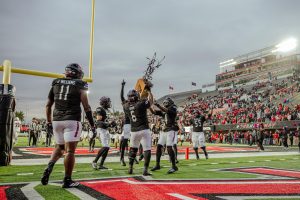NIU votes on academic, artistic freedom
November 14, 1990
Recent trends to protect academic freedom and artistic expression have reached NIU.
The NIU Faculty Senate voted unanimously last week to adopt a position on academic freedom and artistic expression recommended by the American Association of University Professors.
But the agreement does not involve skits or other entertainment presented by student groups.
In a statement, the senate said, “In our judgement, academic freedom in the creation and presentation of works in the visual and performing arts, by ensuring greater opportunity for imaginative exploration and expression, best serves the public and the academy.”
The senate also agreed that artistic expression in the classroom, studio and workshop merits the same assurance of academic freedom that is awarded to other teaching activities.
Institutions are not responsible for the views or attitudes expressed in specific artistic works, and those who present artistic works should not represent themselves or their work as speaking for the institution, according to the statement.
Furthermore, members noted in the statement, “academic institutions offer exhibitions or performances to the public; they should ensure that the rights of the presenters and the audience are not impaired by a ‘heckler’s veto’ from those who may be offended by the presentation.”
Those who choose to view or attend art exhibitions should be able to go free of interference, the senate said.
Members questioned the statement’s relevance to past incidents with Greek organizations performing questionable skits.
The Phi Kappa Sigma fraternity was suspended after performing an ‘offensive’ skit at Greek Sing in February. The skit, called “Grease Row,” included sexual innuendos, references to alcohol and insults pointed at Interfraternity Council policies, sororities and fraternities.
But, “this issue is not directly related to this statement by the AAUP,” said J. Patrick White, Academic Freedom Committee chairman.
“There is a movement on some campuses to prohibit certain kinds of speech, and this has provoked a different kind of controversy. But this statement is directed towards the ‘performing arts,’ while the other issue brought up free speech on campus,” White said.
“I think what we are aiming at, is (the senate) would like to go on record as saying ‘yes, this is offensive but the university is not to be involved,'” White said.
Faculty Senate President J. Carroll Moody said the resolution does not pertain to such skits.
“I feel that (the senate members) who brought that issue up were sincere in their views,” Moody said. “But I thought that was stretching the coverage of this resolution.”
The statement written by the AAUP was first brought to the senate Oct. 3. The senate referred the issue to the Academic Freedom Committee for further examination.
After getting senate approval, the resolution now must get the stamp from the University Council for approval before it is recognized as university policy. The resolution should be on the agenda of the Dec. 12 council meeting, Moody said.
“I think that it is a very appropriate thing for faculty to adopt a resolution based on the AAUP statement, and I hope the University Council will agree to make it a fundamental right,” Moody said.






